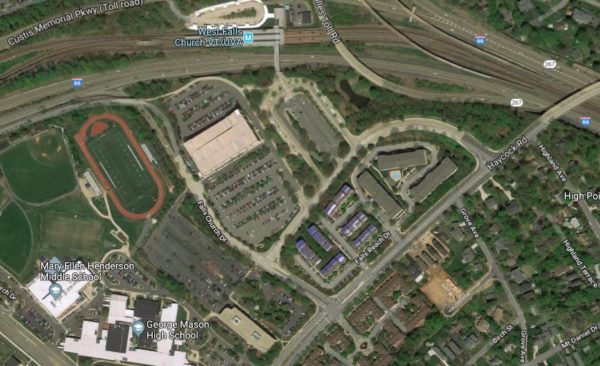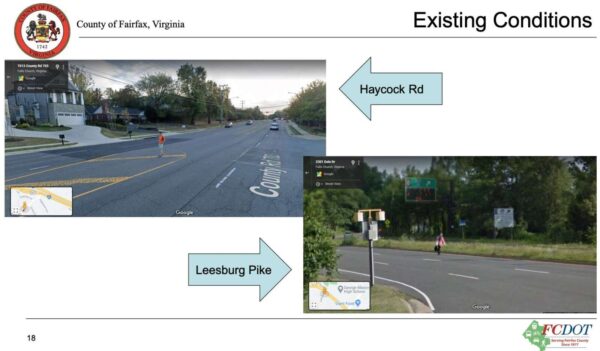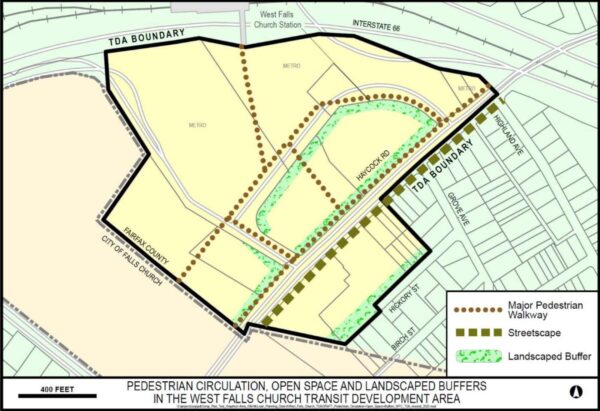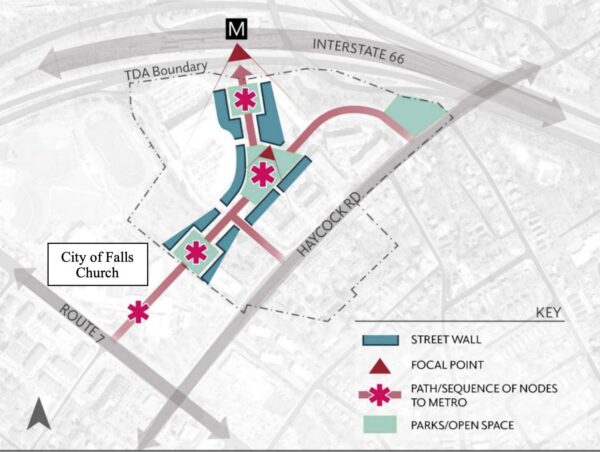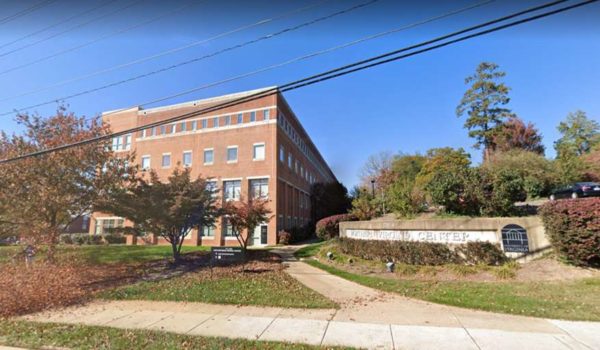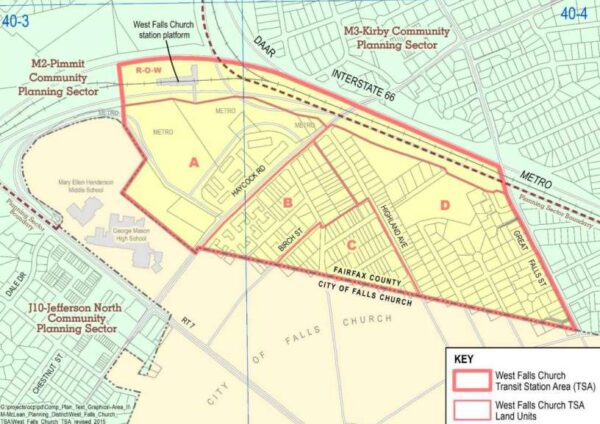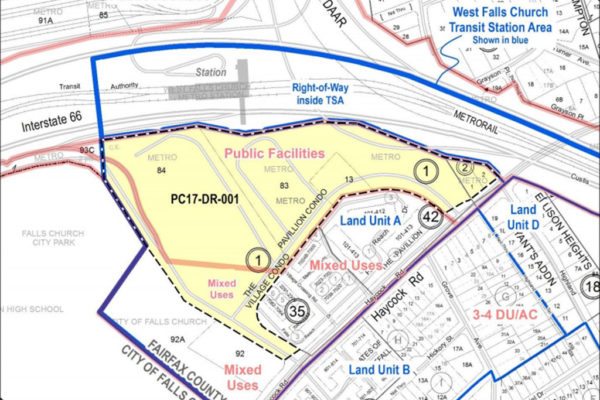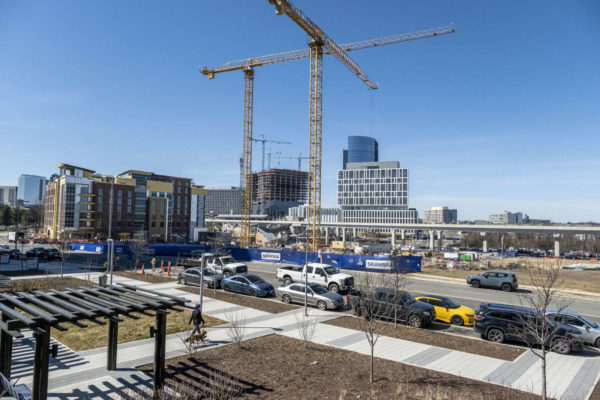The arduous journey toward a re-imagined West Falls Church Transit Station Area is drawing to a close with the last two approvals slated for this summer.
“I want to thank the entire team for two-and-a-half years of dedicated work on behalf of the Dranesville district,” Dranesville District Supervisor John Foust said during a community meeting on Tuesday (May 11). “This has been a long, difficult process, and as a consequence, the product is much better. The time was well spent. The product is good — and getting better — and we still have some time.”
The development plan will go before the Fairfax County Planning Commission on June 16 and the Board of Supervisors on July 13. The plan was narrowly approved by a task force that voted 5-3-1 earlier this month.
When the proposed plan was presented to the community for the first time on Tuesday, however, some residents expressed concerns about traffic along Haycock Road, pedestrian safety, and distance from Virginia Tech’s property.
“I’m not anti-development, but I’m really concerned,” one attendee said. “I’ve been trying to get our streets to be safer as they’re crowded with cars.”
Predicting that the new I-66 exit ramp will pour traffic into the new community, she asked staff to find a way to make it inconvenient to “pop out onto Haycock Road” for those looking to get to Tysons, DC or Arlington “as fast as possible.”
“I know every area is screaming for sidewalks, but one thing you could do is paint the speed limit or look at other creative, inexpensive ways that communities have found to reduce the speed and the number of cut-thru cars, and make better buffers and calming measures for people who live here, pay taxes and are part of the community,” she said.
The draft plan includes language directing the county to develop a West Falls Church Active Transportation Plan with recommendations for transportation improvements that will increase connectivity, fill in missing or inadequate facilities, and promote walking and bicycling.
“County staff are working on this,” county transportation planner Tim Kutz said. “A follow-up motion will be approved after the plan amendment goes forward and we’ll be reaching out in the fall to continue engaging with you. Getting your perspective is going to be critical in developing recommendations to increase active transportation in the area.”
The plan includes mitigation measures for what people perceive as “bad traffic,” with signal timing, new signals and reconfigured intersections, county planner Bryan Botello said.
Residents worried there was little to ensure the local government implements those changes, but staff said these changes will happen when developers come into the picture.
“The improvements approved are recommendations that would happen when the development team is actually going to the rezoning and development review stage,” senior transportation planner Bob Pikora said. “The comprehensive plan informs what we will be doing in the zoning and review phases, but the developments will be up to the development team.”
More landscaped buffers and green spaces have been added to the plan, according to staff.
New plans have not materialized for the Virginia Tech property after the university nixed a project to expand its Northern Virginia Center with a design school and other facilities. But some task force members were keen to get a buffer between the campus and nearby housing.
“We’ve added an additional landscaped buffer between Virginia Tech and the Villages condominium, and added additional language that strengthens the buffer, and creates a linear park,” Botello said.
Housing will be separated from Virginia Tech by landscaped buffers, a pedestrian walkway, a road and streetscaping, according to the plan.
The new plan envisions a sequence of parks through the area instead of the courtyard featured in the current comprehensive plan.
“There are really a lack of options for accessible parks south of I-66, so it was certainly a priority for us when we were drafting the plan,” Botello said, noting that the park areas shown below could take the form of pocket parks, urban greens, or a civic plaza.
A recreational park is envisioned at the northeast corner of the study area, at the corner of Haycock Road and Metro Access Road.
Images via Fairfax County
Plans to overhaul the area around the West Falls Church Metro station are slowly coming together, but some deep divisions over what shape that future will take remain, even as Fairfax County’s three-year effort to update its vision for the area nears a conclusion.
Appointed by Dranesville District Supervisor John Foust in 2019, the West Falls Church Transit Station Area Task Force is a small group with a big task: help determine what the approximately 24 acres of transit-accessible land should look like.
In the group’s penultimate meeting last night, one of the primary points of contention was how Virginia Tech’s 7.5-acre campus on Haycock Road should be separated from residences.
Dwyn Taylor, representing Virginia Tech, was left to address the fallout of the university’s decision not to move forward with plans to expand its Northern Virginia Center with a design school and other facilities.
What will or won’t be built at the site is still up in the air, and Taylor was pressed by task force member Paul Rothstein about how any future construction will divide the campus from nearby residential properties like The Villages.
Taylor answered that he couldn’t provide too many specifics on what the alignment of the campus will look like, because it was still being determined what the curriculum of the school will be.
“What does your curriculum have to do with buffering?” Rothstein said. “So it’s acceptable to you to be fronting right next to our community? Virginia Tech was not a very good neighbor to us. We asked specific questions and never got very good answers…I [hope Taylor] will take back to project executives that it’s important for Virginia Tech to consider being good neighbors to the community they say they’re proud to be part of.”
Task force chair David Wuehrmann noted that buffers are included in the proposed draft amendment to Fairfax County’s comprehensive plan, which was last updated on April 1, but Rothstein said his concern is that what constitutes a barrier is left vague.
One of the few examples of landscape buffering included in the plan is a “linear park,” which Rothstein says could constitute much less than what anyone on the task force is imagining unless specified otherwise.
“If it’s a linear trail, like W&OD trail, that’s not really a buffer,” Rothstein said. “It’s nice language, but nothing says [the] buffer will be at least X. It sounds nice, but there are no teeth in it.”
Photo via Google Maps
When Virginia Tech canceled plans to expand its West Falls Church campus on Feb. 28, the ripple effects could be felt in three different jurisdictions.
The proposed project to establish a design school and a new headquarters building for the Falls Church construction company HITT Contracting at the Northern Virginia Center had been in the works since 2019. It was expected to be part of a sweeping redevelopment of the area around the West Falls Church Metro station.
Officials with Fairfax County, the City of Falls Church, and the Washington Metropolitan Area Transit Authority, which all oversee land around the rail station, say the collapse of Virginia Tech and HITT’s project has not substantially altered their ambitions for the area, but the full consequences are not yet clear.
Fairfax County’s West Falls Church Transit Station Area Study Task Force has postponed a meeting that was scheduled to take place tonight (Tuesday) until April 6 to give county staff more time to assess the implications of Virginia Tech and HITT’s decision.
“Virginia Tech’s decision does not change the County’s overall vision for the West Falls Church transit station area,” the county said in a statement to Tysons Reporter. “The county is evaluating next steps for the current Plan amendment under review given the recent announcement by Virginia Tech.”
Dranesville District Supervisor John Foust assembled the task force in 2019 to make recommendations for updating the Fairfax County Comprehensive Plan for the West Falls Church TSA in light of new development proposals from Virginia Tech and Metro.
While its work was interrupted last spring by the COVID-19 pandemic, the task force has met 20 times over the past two years to evaluate proposed changes related to “the addition of residential and non-residential uses to the TSA, improved connections, and additional parks and open space,” according to Fairfax County.
A draft comprehensive amendment was released on Dec. 9, and a public hearing before the Fairfax County Board of Supervisors is expected to take place late this spring, though an exact date has not been set.
“The main goals for development in the West Falls Church transit station area are encouraging use of rail transit, preserving stable neighborhoods, and enhancing the established sense of community,” Fairfax County said. “…The County looks forward to working with Virginia Tech in the future in fulfilling the goals of the transit station area.”
WMATA spokesperson Sherri Ly told Tysons Reporter last week that its plans to bring mixed-use development to a 24-acre site next to the West Falls Church Metro station have not changed.
The proposal calls for a replacement and reconfiguration of the existing station parking lot, along with the addition of 500-700 units of new residential development, 150,000 square feet of office, and 50,000 square feet of retail. Read More
Route 7 Construction Leads to Gas Leak — Fairfax County Fire and Rescue Department units were dispatched to the 9100 block of Leesburg Pike yesterday afternoon (Monday) when workers “struck a large gas line,” resulting in an outside gas leak. A building at that address was vacant, and the incident did not affect traffic. [FCFRD/Twitter]
McLean Resident Helps Neighbors Get COVID-19 Vaccine — “Over the past week and a half, [Katja] Hom has helped more than 30 people get vaccination appointments at Safeways in McLean, Arlington, Vienna and other parts of Northern Virginia.” [Patch]
Virginia Tech to End Therapy Program at Falls Church Campus — “The master’s program in marriage and family therapy (MFT) will end in August 2023, the university told the Washington Business Journal. The program’s clinic, at 7054 Haycock Road, which provides low-cost mental health services to low-income residents and training opportunities for students, will also shut down.” [Washington Business Journal]
Fairfax County Police Hit With Civil Rights Violation Lawsuit — “A Black man who was Tasered and punched by a White Fairfax County police officer without apparent provocation in 2020 filed a federal lawsuit Monday claiming his civil rights were violated, he was subject to excessive force, and he was falsely arrested.” [The Washington Post]
ViVa Vienna Organizers Hopeful for Memorial Day Weekend Event — Organizers of the Town of Vienna’s annual ViVa Vienna festival hope to hold the event on Memorial Day weekend as usual, after Virginia Gov. Ralph Northam raised the attendance limit on outdoor amusements from 250 to 1,000 people. The festival will likely still operate a little differently to accommodate social distancing protocols. The town will determine a date on Apr. 5. [Sun Gazette]
Fairfax County Board Chair Praises New Federal COVID-19 Relief Package — “Glad to see that the Senate support Americans through @POTUS’s American Rescue Plan. With the $350B to state/local govs, we can continue to provide the assistance our residents need.” [@JeffreyCMcKay/Twitter]
Staff photo by Jay Westcott
Virginia Tech is no longer looking to expand its campus in West Falls Church.
The university announced yesterday (Sunday) that it made a mutual decision with the Falls Church-based construction company HITT Contracting to stop pursuing plans to redevelop its Northern Virginia Center at Haycock Road just south of the West Falls Church Metro station.
The proposed project would have added a new academic building and a research center for design and construction to the center, which currently houses administrative offices and a handful of graduate-level academic programs. It would have also featured a new headquarters for HITT, which is currently located about three miles away on Fairview Park Drive.
“After a period of due diligence and business analysis, HITT and Virginia Tech jointly decided not to finalize a comprehensive agreement for the project,” Virginia Tech said in a statement. “Despite this news, the long-time partners remain committed to working together to advance “smart” building in the construction industry.”
Virginia Tech unveiled plans to redevelop its Falls Church property in July 2019 after it received an unsolicited proposal from HITT through Virginia’s Public-Private Education Facilities and Infrastructure Act (PPEA) process, which allows private entities to develop certain public facilities and infrastructure projects.
University leaders said at the time that the potential expansion of the Falls Church campus was part of a wider effort to reorganize programming throughout Northern Virginia, including by establishing an innovation campus in Alexandria.
Virginia Tech Senior Vice President and Chief Business Officer Dwayne Pinkney says the university will contine to work with HITT “to advance building construction research.”
“Virginia Tech has a long history in Falls Church,” Pinkney said. “We are committed to being there and working with Fairfax County, the City of Falls Church, and other partners to create a vibrant district around our campus.”
HITT still plans to develop a new headquarters building and a school focused on design and construction. The company says it remains interested in collaborating with Virginia Tech on those projects.
“While the redevelopment project isn’t moving forward, we believe deeply in the partnership and our work together,” HITT Vice President of Research and Development Megan Lantz said.
The real estate investment firm Rushmark Properties had also partnered with Virginia Tech on the Northern Virginia Center redevelopment. An individual with the developer confirmed to Tysons Reporter that it is no longer involved.
The Northern Virginia Center expansion was part of an ambitious redevelopment plan for the West Falls Church Transit Station Area that Fairfax County has been coordinating with the university and the Washington Metropolitan Area Transit Authority (WMATA).
The next meeting of the task force appointed to develop recommendations for the West Falls Church TSA study is scheduled to take place virtually on Mar. 16.
Photo via Google Maps
Virginia Tech is launching its newest MBA program option, the Online MBA, in response to the changing needs of students and the workplace in the wake of the COVID-19 pandemic.
“The new format allowed us to combine some of the tried and true features of our established in-person MBA formats and online master of information technology to craft the best possible educational experience for students who value consistent interaction with their classmates and also want the flexibility of an online program,” said Parviz Ghandforoush, associate dean for graduate programs.
“We’ve sought to include the best aspects of our top-ranked Evening MBA, experiential-focused Executive MBA and hybrid Professional MBA, both in curriculum development and online delivery,” said Dana Hansson, director of MBA programs. “We’ve integrated feedback from students in all formats to determine how we can offer the best educational experience online.”
It’s this feedback that informed some of the unique features of the 22-month Online MBA that distinguish it from other online MBA offerings in the marketplace.
While fully online, delivery of the new program will be evenly split between synchronous and asynchronous experiences. “While students appreciate the flexibility of asynchronous learning, many shared with us that meeting synchronously best mirrors an on-campus experience. It allows students to participate actively in class discussions and study teams, develop working relationships with their peers and engage with Virginia Tech’s top-notch faculty,” Hansson said.
The program is cohort-based, which means that students complete their studies in lockstep and have the opportunity to build meaningful professional relationships with their classmates.
Students can choose to specialize their MBA in areas where Virginia Tech has significant expertise, such as cybersecurity, entrepreneurism, health information technology and business data analytics. The program also includes an option to study abroad through the international business specialization.
Online MBA students will also share the support and resources available to all Virginia Tech MBA students. Hansson said this includes access to an established MBA alumni mentoring program, personalized academic advising and membership in Virginia Tech’s vast alumni network.
“We’re excited to provide this new opportunity to professionals across the globe who want to further their careers and join our talented group of students and alumni who are proud to call themselves Hokies.”
Applications for the inaugural cohort are due May 1, with classes starting in July and graduation expected in May 2023.
Learn more at mba.vt.edu/online.
The ever-evolving “security threat landscape” and changes in user behavior and IT infrastructure require IT professionals to keep their knowledge up to date and stay on top of the latest trends and developments.
Earning a 100% online Master of Information Technology or graduate certificate with cybersecurity specialization from Virginia Tech can help individuals meet these heightened demands in a number of ways.
Ranked one of the top online master’s degree for cybersecurity by Cyberdegrees.org and one of the top four online graduate IT programs nationwide by U.S. News and World Report, Virginia Tech’s VT-MIT program takes a unique approach to specialized education.
Core courses in areas such as information systems design, electronic commerce, software engineering and computer programming help students master technical expertise in a business context. After completing these core courses, degree students can choose to specialize in cybersecurity technologies, cybersecurity management or cybersecurity policy. Virginia Tech also offers these topic areas as standalone graduate certificates for those not pursuing the full degree.
Whether interested in running an in-house cybersecurity practice or exploring the legal and ethical concerns triggered by data breaches, students have the opportunity to tailor their education around their career ambitions.
Part of Virginia Tech’s core strength is its world-class cybersecurity research, supported by $15 million in research grants and contracts. Students can access six cybersecurity research centers, including the Ballston-based Hume Center for National Security and Technology.
The VT-MIT program’s 100% online format allows students to pursue higher education at their own by deciding their own course load each semester. Further enriching the student environment is the program’s openness to students with diverse backgrounds and interests, including business line leaders looking to improve their technology capabilities while leveraging their domain expertise.
Combating today’s cyber threats has never been more difficult — or more critical to business continuity. A Master of Information Technology degree with cybersecurity specialization or standalone graduate certificate from Virginia Tech can help leaders better understand the systemic nature of these threats and teach them strategies for dealing with an increasingly complex security landscape.
Learn more about Virginia Tech’s 100% online Master of Information Technology with cybersecurity specializations at vtmit.vt.edu.
The COVID-19 pandemic continues to impact every aspect of modern-day life, from the way consumers buy their groceries to how employees connect to corporate systems. Learning is no exception.
Since the outbreak, online learning has become more central to people’s lives. And many plan to continue the trend: More than half of American adults who expect to need more education or training post-pandemic say they would do it online, according to an August 2020 survey by the Strada Education Network.
Yet not all online education is created equal — and IT pros looking to invest in a program should compare and contrast options carefully.
Whether pursuing a full-time master’s degree to deepen IT expertise or seeking a certificate to boost content knowledge in a specific area, there are many reasons why Virginia Tech’s 100% online Master of Information Technology program (VT-MIT) is a superior choice for IT leaders.
The U.S. News & World Report’s Best Online Programs report ranks Virginia Tech’s MIT degree the nation’s fourth best. The program blends coursework and offers twelve areas of specialized study for a diverse education.
Courses are taught by world-class faculty experienced in translating a robust academic experience to an effective online format. For nearly 20 years, the VT-MIT program has relied on a two-tiered system of master faculty and distance learning instructors who together deliver a superior online classroom experience that encourages peer-to-peer support, faculty-to-student mentoring and real-time engagement, making VT-MIT a leader in the online education space long before COVID-19 forced other programs to go virtual.
Students can also expect to reap these advantages:
- Increased Flexibility — Students can choose their own timeline and toggle between full- and part-time schedules, depending on employment status and current workload.
- Greater Convenience –– A combination of synchronous and asynchronous online classes allows students to learn anywhere, anytime — ideal for remote workers unsure of when they may return to the office.
- Enhanced Value — Students can earn a VT-MIT degree at a universal tuition rate (no residency required) from a well-respected public institution.
Today’s IT professionals must act fast to keep pace with a rapidly evolving IT environment. Experience and specialized IT skills are critical to making the right technology decisions, at the right time. With the flexibility of an online VT-MIT degree or graduate certificate, IT leaders can strike the perfect balance: earn a respected credential that will help them confront the technological challenges of the 21st century while accommodating new realities.
As the COVID-19 pandemic extends, many professionals are taking this time to prepare for the future by investing in graduate education. And there might not be a better time to do so.
Whether it’s the increased flexibility in classroom formats, frozen tuition rates, relaxed admission requirements, or reduced interest rates on student loans, there are plenty of reasons why students feel like this time period is a unique opportunity for them to build the skills and professional network they need to advance their career.
While fall classes have already started, there are still options for individuals who want to take advantage of graduate study opportunities before next year’s back-to-school season. Virginia Tech’s local Evening MBA program offers a spring entry term with classes starting January 19.
The Evening MBA is a top 20 nationally ranked program designed with maximum flexibility for working professionals.
Students choose their own course load each semester, so those dealing with job uncertainty or working parents with new childcare demands can find the right workload for them and even easily switch between full- and part-time status.
While classes typically take place in-person on weekday evenings at Virginia Tech’s conveniently located Falls Church center, the current environment shifted instruction mode to primarily online, with some classes still offering an in-person option.
The flexible program format contributed to what associate director of MBA recruiting Rebecca McGill described as a “significant increase in applications and enrollments for the fall term.” She added that many also chose this time to apply because they can “take advantage of relaxed GMAT/GRE test score requirements that have never been offered before.”
For spring applicants, the Evening MBA reduced the number of years of work experience required for a test score waiver from ten years to five.
McGill expects the increased application trend to continue for the spring term “as more and more individuals use this time to invest in themselves and their future.”
Applications for the spring semester are due December 1. Learn more at evening.mba.vt.edu.
Not everyone has the time or financial resources to commit to a full master’s degree program. Some may already have a master’s and are just looking for a narrow update on a current skillset. For these reasons, Virginia Tech’s 100% online Master of Information Technology program now offers IT professionals the option to earn a graduate certificate in 10 specialized IT subject areas.
“IT leaders can find a certificate that speaks exactly to their professional needs without having to commit several years to pursuing a master’s degree,” says Barbara Hoopes, Associate Professor of Business Information Technology at Virginia Tech. In fact, students can earn a certificate in as little as 12 months as a part-time student.
Whether looking to simply enhance existing skills or prepare for a major career transition, students can expect to reap these rewards:
Enhanced Marketability — Both experienced and aspiring IT professionals can enhance their expertise through thoughtfully designed certificates that allow students to develop skills in areas where a current dearth of talent is driving competitive salaries and prime opportunities for career advancement.
Explore High-Demand Areas — Earning a certificate offers a relatively quick opportunity to explore a high-demand content area, like Cybersecurity, Business Data Analytics, or Health Information Technology, to boost marketability and stay abreast of IT trends. Employers can also use a certificate “to contribute to the skill sets and the knowledge base of employees without having to release them to earn a degree as a full-time student,” says Hoopes.
Greater Convenience — Exclusively online, a VT-MIT master’s degree or graduate certificate satisfies an increasing demand among IT workers for greater flexibility. Students can easily switch between full or part-time status and shift their course loads to match their personal and professional demands. An online VT-MIT degree or graduate certificate offers students the skills they need while at the same time balancing today’s personal, professional and academic demands.
Learn more about Virginia Tech’s 100% online Master of Information Technology and graduate certificate options at vtmit.vt.edu.


